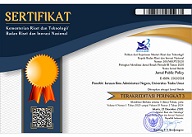PENGARUH ARUS KAS BEBAS, ARUS KAS OPERASI, KEPEMILIKAN MANAJERIAL, LEVERAGE KEUANGAN DAN UKURAN PERUSAHAAN TERHADAP MANAJEMEN LABA PADA PERUSAHAAN MANUFAKTUR YANG TERDAFTAR DI BURSA EFEK INDONESIA
Abstract
Abstract: The objective of this study was to test the influence of free cash flow, operating cash flow, managerial ownership, financial leverage, and firm size on earnings management at manufacturing firms registered in the Indonesian Stock Exchange in 2012-2016. The study was aimed at testing hypotheses. The sample was selected by using a purposive sampling technique, resulting in the selection of 106 firms. The data were obtained from annual report and analyzed by using panel data regression. The study result shows that the free cash flow and operating cash flow, financial leverage influenced the earnings management, while managerial ownership, firm size did not influence the earnings management.
Keywords: Earnings Management, Free Cash Flow, Operating Cash Flow, Financial Leverage, Managerial Ownership, and Firm Size
Abstrak: Penelitian ini bertujuan untuk menguji pengaruh arus kas bebas, arus kas operasi, kepemilikan manajerial, leverage keuangan, dan ukuran perusahaan terhadap manajemen laba pada perusahaan manufaktur yang terdaftar di bursa efek Indonesia tahun 2012-2016. Jenis penelitian yang digunakan adalah pengujian hipotesis. Sampel yang dipilih menggunakan purposive sampling yaitu sebanyak 106 perusahaan. Data diperoleh dari laporan tahunan dan dianalisis menggunakan metode analisis regresi data panel. Hasil penelitian menunjukkan bahwa arus kas bebas dan arus kas operasi, leverage keuangan berpengaruh terhadap manajemen laba, sedangkan kepemilikan manajerial, ukuran perusahaan tidak berpengaruh terhadap manajemen laba.
Kata Kunci: Manajemen Laba, Arus Kas Bebas, Arus Kas Operasi, Kepemilikan Manajerial, Leverage Keuangan, dan Ukuran Perusahaan
Full Text:
PDFReferences
Agustia, D. (2013). Pengaruh Faktor Good Corporate Governance, Free Cash Flow dan Leverage terhadap Manajemen Laba. Jurnal Akuntansi dan Keuangan, 15(1), 27-42.
Arfan, M. (2006). Pengaruh Arus Kas Bebas, Set Kesempatan Investasi, dan Financial Leverage terhadap Manajemen Laba. Disertasi. Bandung: Program PascasarjanaFakultas Ekonomi Universitas Padjajaran.
Armein, R. A. (2005). Analisis Kasus Laporan Keuangan PT. Indofarma, Tbk.
Analisis Kasus Laporan Keuangan, 4(3), 19-20.
Andreas, A. (2017). Analysis of Operating Cash Flow to Detect Real Activity Manipulation and its Effect on Market Perfomance. International Journal of Economics and Financial Issues, 7(1), 524-529.
Banimahd, B., & Aliabadi. M. J. (2013). A Study on Relationship Between Earnings Management and Operating Cash Flows Management: Evidence from Tehran Stock Exchange. Journal Management Science Letters, 3, 1677-1682
Barkhordar, M., & Tehrani, R. 2015. Investigating the Effect of Free Cash Flow, Devidend, and Financial Leverage on Earning Management in Listed Companies in Tehran Stock Exchange. International Jurnal of Humanities and Culture Studies, 12, 124-143.
Brigham, E. F., & Houston, J. F. (2010). Dasar-dasar Manajemen Keuangan (Essential of Financial Management). Buku 1. Edisi 11. Terjemahan oleh Ali Akbar Yulinto. Jakarta: Salemba Empat.
Bukit, R., & Nasution, N.F. (2015). Employee Diff, Free Cash Flow, Corporate Governance and Earning Management. Preocedia Social and Behavioral Scrences, 211, 585-594.
Cardoso, C. T. F., Martinez, L, A., & Teixeira. C. J. A. (2014). Free Cash Flow and Earnings Management in Brazil: The Negative Side of Financial Slack. Global Jurnal of Management and Business Study Accounting and Auditing,14(1), 84-96.
Chinthya, N. C., & Indriani, M. 2015. Arus Kas, Komite Audit dan Manajemen Laba Studi pada Perusahaan Manufaktur Indonesia. Jurnal Dinamika Akuntansi dan Bisnis, 2(2), 167-183.
Chung, R., Firth, M., & Kim, J.B. (2005). Earning Management, Surplus Free Cash Flow, and External monitoring. Journal of Business Study, 58, 766-776.
Cornett, M. M., J. Marcuss, Saunders &Tehranian H. (2006) Earnings management, corporate governance, and true financial performance. http://papers.ssrn.com/.
Dahler, Y., & Febrianto, R. (2006). Kemampuan Prediktif Earning dan Arus Kas dalam Memprediksi Arus Kas Masa Depan Perusahaan. Simposium Nasional Akuntansi IX, Padang.
Dechow, Patricia., M., & Ge, Weili. (2006). The Persistence of Earning and Cash Flows and the Role of Special Item: Implications for the Accrual Anomaly. Journal School of Business, 11, 253-296.
DOI: https://doi.org/10.35308/akbis.v0i0.1017
Refbacks
- There are currently no refbacks.





